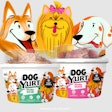As people opt for more organic foods, the trend is also crossing over to petfoods, but a veterinarian is cautioning pet owners that these human food trends may not always meet the nutritional needs of pets.
In a recent Huffington Post article, Dr. Karen Becker says that dogs and cats need wholesome, "living foods," just as people do. She says these "living foods" consist of uncooked foods that contain unheated and unprocessed, natural enzymes. Dr. Becker says she feels the most nutritious diet to feed a pet is one that is prepared at home from real, whole, human-grade foods. She says the next-best option is to buy a premium petfood, especially canned or rehydrated options.
However, Dr. Becker warns that all human food trends should not be carried over to petfoods, as pets have different nutritional needs than humans do. For example, Dr. Becker says there should be no need to specially market a petfood as a "gluten-free" petfood formula, since gluten is found in grains, which are not an ingredient dogs and cats biologically require. Other terms like "organic" and "holistic," she says, are used as marketing tactics as well. While Dr. Becker does not believe these foods are bad to feed a pet, she says the first thing a pet owner should look for is that the diet is species-appropriate and balanced, not for words on the package.
Another concern of Dr. Becker is that petfood manufacturers market a food for a specific group of animals, such as for older or obese animals, despite the fact that each animal is different with its own, unique needs. She recommends that pet owners consult a holistic veterinarian to develop a custom nutrition plan for their pet. Experimenting, she says, is a good way to decide on what type of food is best for your pet, re-evaluating your pet's needs as they age.
For commercial petfoods, Dr. Becker says pet owners should do their research on the ingredients and quality of which ever petfood brand they choose. Basic species-appropriate ingredients in a food would include a high-quality protein source from animal muscle meat that does not come from by-products of animals, moderate levels of animal fat, high levels of the essential fatty acids EPA and DHA, a high moisture content and a few fresh-cut vegetables and fruits.
















